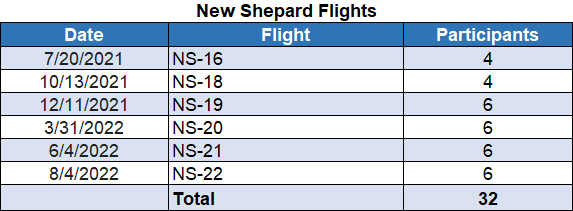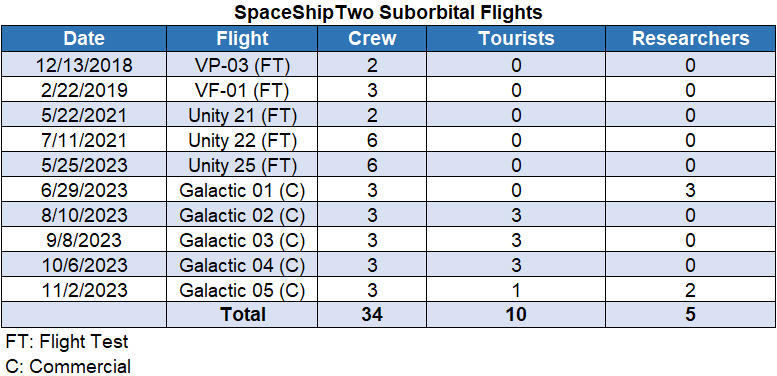Twenty years ago this month, on Dec. 17, 2003, the SpaceShipOne suborbital rocket plane made its first powered flight with Scaled Composites test pilot Brian Binnie at the controls. The small spacecraft reached a top speed of Mach 1.2 and an altitude of 20.67 km (12.8 miles) after being dropped from its White Knight carrier aircraft.
Less than a year later, on Oct. 4, 2004, Binnie made the second flight required to win the $10 Ansari X Prize for the first commercial crewed vehicle to reach space twice in 14 days. The spacecraft reached 112.014 km (69.6 miles), breaking a record for winged vehicles set by the X-15 rocket plane in 1963.
Many promises were made about how this achievement would soon open the flood gates to suborbital space tourism. It would take a while.
SpaceShipOne begat SpaceShipTwo, which would finally begin commercial service 19 years later in June 2023. Rival Blue Origin began flying paying customers two years earlier in July 2021.
So how are the two companies progressing in opening space to billionaires, millionaires, raffle winners and researchers? The answer: slowly. The glaciers are melting faster.
Gradatim Summo: Step by Step, Eventually
Blue Origin has conducted six New Shepard flights with 32 people on board. The flights carried 31 individuals, with customer Evan Dick flying twice.
Of the 31 individuals who flew to space, 25 of them are believed to have paid for their flights. Six others were company employees or invited guests who are believed not to have paid for their flights.
Blue Origin and Amazon Founder Jeff Bezos was aboard the maiden New Shepard flight on July 20, 2021. He invited his brother Mark to ride with him. Two Amazon employees, Gary Lai and Audrey Powers, flew on different flights.
Jeff Bezos also invited Star Trek actor William Shatner and Laura Shepard Churchley, who is the daughter of the first American in space, Alan Shepard, after whom the suborbital spacecraft is named.
All the flights have exceeded the 100 km (62.1 mile) boundary of space recognized by the Fédération Aéronautique Internationale (FAI), the world governing body for air sports that maintains definitions and records for aeronautical and space flights.
New Shepard has been grounded since September 2022 after the booster failed on an uncrewed flight containing microgravity experiments. The capsule landed under parachutes after being blasted away from the failing booster by an escape motor.
The Federal Aviation Administration (FAA) has closed the company-led investigation into the accident. Blue Origin has said it is working on modifications to New Shepard. It has not set a date for the next launch, which will carry the experiments that were on the failed flight.
Virgin Galactic Launches
Virgin Galactic’s VSS Unity has flown 10 suborbital flights evenly split between flight tests and commercial missions. Unlike the automated New Shepard, two pilots are required to fly SpaceShipTwo. The company has also had astronaut instructors on all five commercial flights to help the paying customers who were aboard.
Thus far, the company has flown 34 crew members, 10 tourists and five researchers who conducted experiments during the flights. Eight of the tourists are believed to be “founder astronauts” who purchased tickets when they cost $200,000. Two winners of a raffle conducted by Space for Humanity flew on one mission. It is likely those tickets were sold at the current price of $450,000 per seat. Virgin Galactic charges researchers $600,000 apiece.
The 34 crew members included six pilots who flew SpaceShipTwo. Mike Masucci has flown six flights, the highest total among pilots. Five employees and Virgin Group Founder Richard Branson flew in the passenger cabin. Chief Astronaut Instructor Beth Moses has flown six times.
VSS Unity has not reached 100 km (62.1 miles), which means the FAI does not recognize the missions as spaceflights. However, the ship has exceeded the 50-mile boundary (80.5 km) that the United States considers to be the boundary of space.
The company has said it plans to fly two or three additional missions in the first half of 2024 before retiring VSS Unity. The flights will have all six seats filled with paying customers instead of flying an astronaut instructor.
Due to weight and other restrictions, VSS Unity can only carry four paying passengers at a time. It also requires about a month to turn around between flights. Company officials said it is difficult to make money flying a single spacecraft at that cadence.
Virgin Galactic has said it will concentrate on building a fleet of advanced Delta class ships capable of flying up to twice per week while carrying six customers. The first Delta class ships are set to begin flight tests in 2025 and commercial service in 2026.





